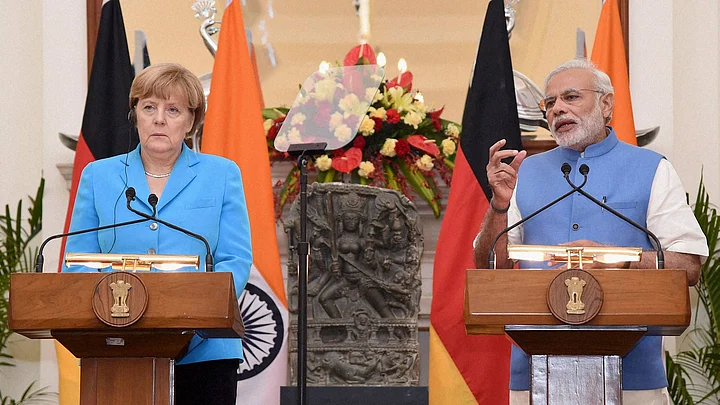German Chancellor Angela Merkel’s three-day visit (October 4-6, 2015) to India, coming within ten days of her meeting Prime Minister Modi in New York in a gathering of G4 nations, signifies a new dynamism in bilateral ties. It is also significant that this visit takes place within six months of Modi’s first visit to Germany in April 2015 after becoming Prime Minister.
As was the case during Modi’s visit to Berlin, the focus during this trip will also be on providing a decisive impulse to two-way economic, defence and security engagement. Regional and global issues like Afghanistan, climate change and refugee crisis will also be discussed.
Smart cities and high-speed trains, German medium and small enterprises, Make in India, clean energy and defence, skill development, railways, agriculture, education, science and technology, water and waste management are among the top priorities of New Delhi.
Merkel and German businessmen may wish to focus on their technology contribution to smart industries.
Indo-German Relations
Germany is India’s largest trading partner in the European Union and 6th in the world with a trade turnover of 16 billion euros in 2014. For Germany however, India ranks a low 25th. The target of 20 billion euros set for 2015 is unlikely to be realised.
Bilateral trade has declined over the last few years ostensibly due to international economic volatility and fragility. Around 1,600 Indo-German collaborations and 600 joint ventures are currently in operation.
German strengths and India’s priorities are aligned. Both sides are determined to arrest the downslide and provide a resolute push to take relations to new heights.
This keen desire is reflected in the high power delegation accompanying Chancellor Merkel; it comprises six cabinet ministers, including ministers of foreign affairs, economic cooperation and development, science and technology, education and research, as well as several business leaders.
Modi is also making the unusual gesture of accompanying Merkel to Bengaluru on October 6 where both will participate in a business event hosted by NASSCOM on ‘Industry 4.0’, and also visit the innovation and skilling centres being operated by German company Bosch.
India-Germany Collaboration
- Focus of Merkel’s trip will be on providing a decisive impulse to two-way economic, defence and security engagement
- As a trading partner for Germany, India ranks at an abysmal 25
- Both sides are determined to provide a resolute push to take relations to new heights
- Kick-starting the stalled negotiations on India-EU Bilateral Trade and Investment Agreement (BTIA) expected to figure prominently in discussions
- Germany looking towards India for its skilled workers to fuel its growth
Strategic Partnership
Merkel and Modi co-chaired the third Indo-German Intergovernmental Consultations on 5 October 2015. 18 MoUs for cooperation in various fields including higher education, civil aviation, railways and food safety were signed. A fast-track agreement to help German businesses was also reached. Germany will provide assistance of over 1 billion euros each for India’s green energy corridor and solar projects.
Bilateral deliberations will continue in Bengaluru on 6 October 2015. Decisions taken during the visit will add further substance to the strategic partnership, which has continued to develop successfully since it was launched in 2001. During the last decade, German companies have invested more than 5 billion euros in India while Indian companies have invested 4 billion euros in Germany.
Ensuring Easy Flow of Trade
Kick-starting the stalled negotiations on India-EU Bilateral Trade and Investment Agreement (BTIA) which were launched with much fanfare in 2007 is expected to figure prominently in discussions. Issues like access for wines, spirits and automobiles in the Indian market, IPR protection in India and greater access for Indian IT service providers in EU have held up progress over the last few years.
Talks were to commence in late August this year, but were put off in protest by India because of the import ban by EU on 700 generic drugs for alleged manipulation of clinical trials by GVK Biosciences. India termed the ban as arbitrary. Both sides will benefit from easier flow of trade. The EU should work assiduously to quickly seal a deal as India has steadily inched its way to become the fastest growing emerging economy.
Boosting Bilateral Ties
India should approach the talks with greater confidence as it has shot ahead to become the most attractive investment destination. It registered FDI inflow of USD 31 billion over the first six months of this year, according to a report published by the Financial Times. This is against USD 26.4 billion during the whole of 2014.
It has improved its position in global competitiveness index by 16 ranks which reflects positively on the decisions made by the Modi government since it assumed power in May 2014.
Issue of killing of two Indian fishermen off the Kerala coast by two Italian marines in 2012 has held up progress on this issue particularly after the former Italian Foreign Minister Federica Mogherini became the EU High Representative for Foreign and Security Policy last year. She adopted a particularly hostile attitude towards India. This issue has been temporarily put on the back-burner by the recent interim decision of the International Court of Justice which provides some hope of progress on BTIA Talks.
India has much to offer Germany. Germany needs skilled workers to fuel its growth and access to an emerging market like India. Germany’s acknowledged competencies in manufacturing, skill development, high technology, clean energy as well as water and waste management can provide a robust foundation for an enhanced bilateral partnership.
(The writer is a former Indian Ambassador to Kazakhstan, Sweden and Latvia.)
